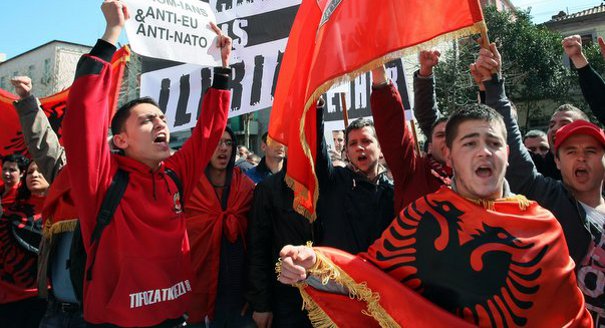This is not the time to take your eyes off the Balkans, where a crisis is slowly unfolding that could have immense strategic repercussions for the European Union.
This simmering crisis stems from Greece’s economic woes.
It is easy to forget that Greece, but also Italy, have been the most important economic players in Serbia and Macedonia, Montenegro and Albania. Russia has a big presence as well.
In Serbia and Macedonia, Greek companies invested in the cement, construction, services, and telecoms sectors. Greek banks established subsidiaries all over the region.
Economists in Belgrade reckon that Serbia alone is already indebted by 727million euro to subsidiaries of foreign banks. A third of the banks are Greek, the worst possible investor at this time because Greek banks require major recapitalization.
“Financial sector vulnerabilities are a particular concern,” the European Bank for Reconstruction and Development stated in its regular Regional Economic Prospects report published last month. ”The vast majority of the banking system [in the region] is foreign-owned.”
The extremely shaky banking system has led to a squeeze on credits, shrinking investments and economic growth across the region.
The Vienna Institute for International Economic Studies, in a grim report published last March, expects minimal growth in Southeastern Europe. The countries include Albania, Bosnia and Herzegovina, Bulgaria and Macedonia, Montenegro and Romania, and Serbia. It estimates that the region will grow by only 0.1 percent this year. One of the biggest casualties is the labor market.
Already last year, the average unemployment rate for those six countries was 23.7 percent, with Bosnia and Herzegovina and Macedonia among the highest: 43.4 percent and 31.8 percent respectively.
These statistics are frightening.
Firstly, more young people are becoming unemployed, with fewer and fewer prospects for graduates.
Secondly, migration is no longer an option for them.
In the past, Greece was a favored destination for the young seeking seasonal work or long-term employment. “That has dried up,” Marko Savkovic, analyst at the Belgrade Center for Security and Policy, told Strategic Europe.
Thirdly, the social welfare systems in Southeastern Europe are neither developed enough nor sufficiently funded to provide much of a cushion for the armies of young people seeking jobs and some perspective.
And fourthly, this growing army of young, disillusioned, and desperate people present a golden opportunity for nationalists, populists, and Euro-skeptics in a way that could revive old rivalries, and thus tensions in the region.
The potential for instability is there.
It does not help that there is still no functioning government in Bosnia and Herzegovina—a dysfunctional EU protectorate ever since the Dayton Accords ended the fighting there in 1996.
Nor does it help that Serbia last month elected Tomislav Nikolic as its next president.
Despite his support for Serbia joining the EU, Nikolic has a long Serbian nationalist biography. He also supported the Serb-led Yugoslav army against Croatian independence during the early 1990s.
His recent comments in an interview that Greater Serbia was his dream did not go down well with his Croatian counterpart, Ivo Josipovic.
Josipovic said he would not attend Nikolic’s inauguration unless he reneged on his remarks about a Greater Serbia.
As Croatia prepares to join the EU, this is not the time for two former sworn enemies who in recent years have made a big effort at reconciliation, to re-open old wounds.
Nor does the stand-off between Kosovo Serbs and local Albanians on the border between Kosovo and Serbia over the past year help.
NATO peacekeeping troops have repeatedly had to intervene at the border between Serbia and Kosovo, which Serbia does not recognize as an independent state.
Nor does the debilitating dispute between Greece and Macedonia help defuse a potentially combustible nationalist, historical dispute.
Greece has consistently blocked Macedonia joining NATO and the EU.
Athens claims that the use of the name Macedonia—which is also the name of Greece’s northernmost province—would be used by Macedonia for territorial aspirations to claim Greek territory.
So when Macedonia a year ago erected a bronze statue of Alexander the Great, the legendary conqueror of Greece, Athens condemned the act, calling it a provocation.
There are so many other examples of tensions.
What it means is that there is unfinished business in this part of Europe that has every potential to spill over.
Now, more than ever, is the time to reassure the region that its perspective is the EU, despite the euro crisis, and not a region seeped in distrust, violence, and nationalism and so susceptible because of its history.
That may seem glib. But recall the past, when the EU admitted Greece in 1981.
It was not because Greece was a shining democracy or powerful market economy.
It was because EU countries realized that extending the stability, unity, and prosperity of post-1945 Europe also meant anchoring countries emerging from dictatorships or military rule to the EU.
That has been the EU’s greatest success and greatest attraction.
In dealing with the Western Balkans, we need to remember that.






.jpg)